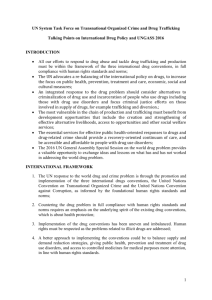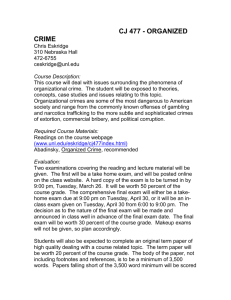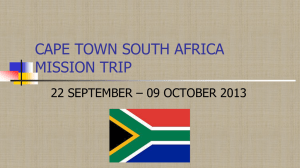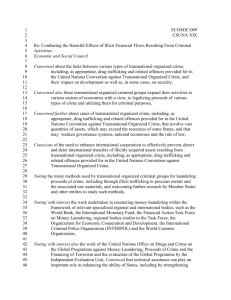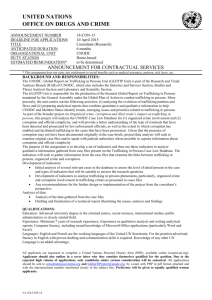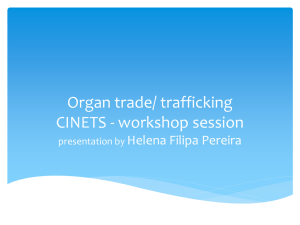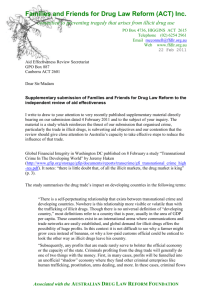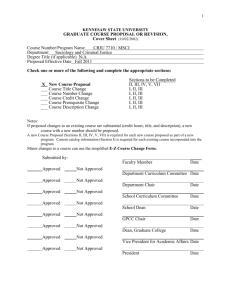2- Cyber crimes - Permanent Mission of IR IRAN
advertisement
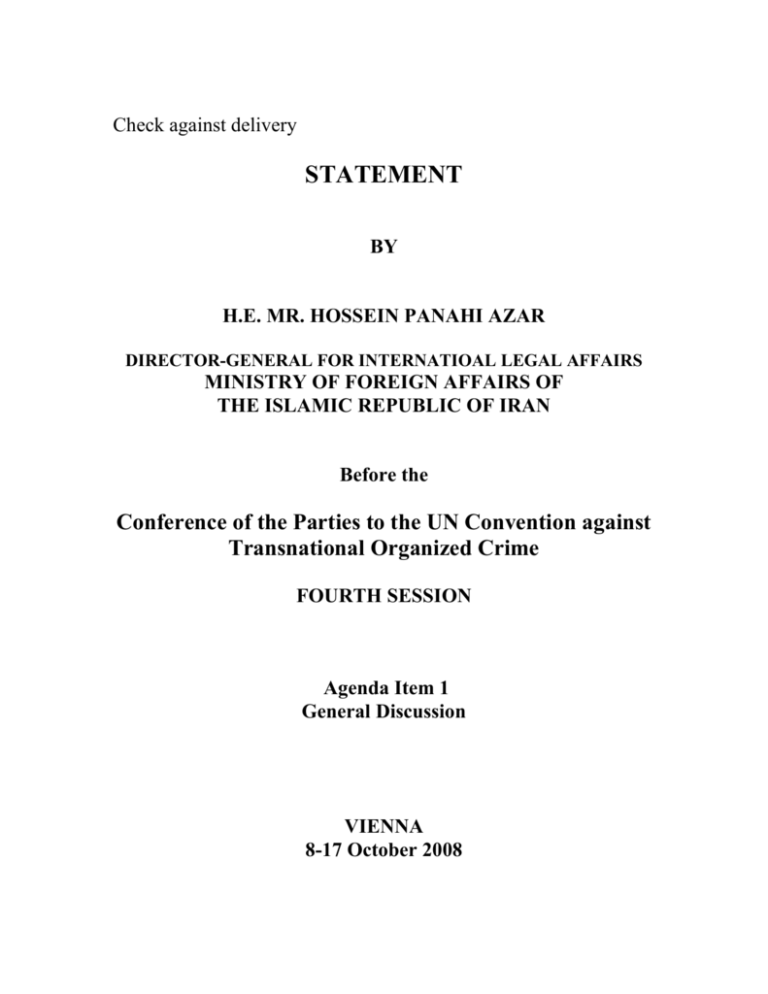
Check against delivery STATEMENT BY H.E. MR. HOSSEIN PANAHI AZAR DIRECTOR-GENERAL FOR INTERNATIOAL LEGAL AFFAIRS MINISTRY OF FOREIGN AFFAIRS OF THE ISLAMIC REPUBLIC OF IRAN Before the Conference of the Parties to the UN Convention against Transnational Organized Crime FOURTH SESSION Agenda Item 1 General Discussion VIENNA 8-17 October 2008 In the name of God, the Compassionate, the Merciful Madam President, At the outset, I would like to congratulate you and your colleagues at the Bureau on your election. My Delegation also wishes to extend its congratulations to the Secretariat of the UNODC for the excellent arrangement of this session. My Delegation fully endorses the statement read by distinguished Ambassador of Pakistan on behalf of G77 and China. Madam President, Transnational organized criminality continues to adversely affect our daily life by burdening our national economies, undermining our security and safety, and weakening our confidence and trust toward our political structures. The international community has managed to reach a common understanding on the most challenging threats we face. And as a result, a consensus emerged on the need to expand cooperation among all countries to overcome the perceived dangers. The adoption of the United Nations Convention against Transnational Organized Crime and its Protocols, aiming at the prevention and suppression of the most threatening forms of organized criminality, is an indicative of such consensus. However, despite the existence of such a collective will – which is of course the prerequisite for any coordinated work against the menace – the increase in organized criminality continues to stand as a real obstacle to the socio-economic improvement of all countries. The only way to overcome such a sophisticated disorder, as organized crime has proved to be, is through 1 collective effort and international cooperation. Given the facts above, the Islamic Republic of Iran has done its outmost to fight transnational organized crime effectively. Some of the actions which my country has taken to fight different forms of organized crime, since the third session of the Conference of the Parties to the UN Convention against Transnational Organized Crime which was held in October 2006 in Vienna, are as follows: 1- Money laundering The I.R of Iran is fully determined to fight money laundering. My country, in fighting the menace, has taken the following actions, amongst others: A) Adoption of a new Anti- Money Laundering Law The new Anti-Money Laundering Law was passed by the Iranian parliament on 22 January 2008 and is now a part of Iranian penal law. The aforementioned law imposes strict mechanisms to verify the lawfulness of the origins of any financial transactions in the banking system. According to this law, funds of illicit origin are to be traced and identified in order to block their transfer and entrance into the monetary and/or financial institutions. B) Promotion of regional and cross border cooperation At the regional level, the I.R of Iran has also played an active role to promote cooperation in fighting money laundering. In this regard, the first meeting of the interior ministers of the Economic Cooperation Organization (ECO), on coordination of policies and programs for the campaign against transnational organized crime was held in Tehran from 1 to 3 November 2006. The ECO 2 interior ministers in the Final Declaration, given the adverse consequences and effects of transnational organized crime, emphasized the necessity of adopting a common and comprehensive strategy to fight all forms of transnational organized crime including money laundering. 2- Cyber crimes The Iranian authorities see legislations and other measures against cyber crime as the priorities in fighting many other forms of organized crime and recognize that international cooperation and utilization of international best practices would facilitate fulfillment of this objective. This is also evidenced by cyber crime being identified as one of the five key areas targeted by the Iranian National Commission on Making Criminal Policy and Reforming the Penal Laws. Very recently and on 9 September 2008, the Iranian Parliament accepted a draft bill against cyber crime which is on process of its final approval. This draft bill, comprising 5 chapters and 42 Articles, criminalizes the unlawful acts related to cyber technology and develops a coordinated response mechanism to cyber crime related offences. 3) Illicit production and trafficking in narcotic drugs Fighting illicit production and trafficking in narcotic drugs, as the oldest form of transnational organized criminality, has for decades been, and still is, a top priority for the international community. It is unfortunate, however, that despite the existence of relatively sufficient international legal apparatus, the production of opium and trafficking in narcotic drugs has sharply increased within recent years which for sure, will have its direct 3 impact on the increase of other forms of the organized crime in the world. Madam President, Member States should recognize that action against the world drug problem is a common and shared responsibility and must be addressed in a multilateral setting. The Islamic Republic of Iran, as a country at the forefront of fighting illicit Norco-drug trafficking, has encouraged and supported creating proper mechanisms for international and regional cooperation to better countering drug-related crimes. My country particularly has been supportive to the regional initiative called “The Triangular Initiative” between the I.R of Iran, the I.R of Afghanistan and the I.R of Pakistan (with the support of the UNODC). My country has participated actively in the above related Triangular Ministerial meetings including the first one in Vienna (in July 2007). My country has also been the host of the second Triangular Ministerial meeting in May 2008 in Tehran. In August 2008, the I.R of Iran also hosted the third session of NOMAK Project which collects and analyses information on heroin trafficking. This gathering was attended by participants from 23 countries and 4 international organizations. 4) Trafficking in persons Trafficking in persons, especially women and children, is one of the most serious manifestation of organized crimes, extending beyond boundaries and jurisdictions. Therefore, Combating and preventing human trafficking requires integrated actions by all countries especially on areas such as; prevention, prosecution and protection. Sexual exploitation, including child pornography and prostitution, has 4 continued to be a major motivation for human trafficking. Therefore concerted action is needed at the local, national, regional and international levels to bring an end to this scourge. Removal of and trafficking in human organs is another cruel and inhumane elements of trafficking in persons which needs to be taken very seriously. Considering the serious health implications and the severe human rights violations of the vulnerable victims, it is essential that this issue gets the desired attention. It is also imperative to bear in mind that the supply of human beings for prostitution, forced labor or removal of human organs could not effectively be suppressed unless demand for them is controlled. Given that, an active campaign at global level shall be developed in order to target demand side of the problem. Madam President, Trafficking in human beings to and/or from Iranian territory for the purposes of sexual exploitation and/or forced labor and/or removal of organs is criminalized in accordance with a specific law which was approved by the Parliament in 2004. The adoption of the above law by the Iranian Parliament is expected not only to strengthen the domestic legal regime against human trafficking but also to prepare the legal base for some obligations on criminalizing the human trafficking which have been stipulated in the protocol against Trafficking in Persons (especially women and children). Although the new law has already entered into force, but the responses by the criminal justice system and law enforcement entities had to be improved to tackle all aspects of the problem. For this reason and in 2007, the I.R of Iran established a coordinated mechanism involving all relevant stakeholders, including the Judiciary, the law enforcement and the civil 5 society, to better fight the scourge. Furthermore, extensive measures have been taken by related bodies including Iranian Welfare Organization to support victims and assist the vulnerable groups during the past 2 years. The Islamic Republic of Iran, as a transit country, has also taken serious steps in implementing several projects on enhancing border control, in order to better fight transitional organized crime including human trafficking. My country has benefited from technical assistance provided by the UNODC in implementing the project on Measures to prevent and combat trafficking in human beings in the Islamic Republic of Iran. The main purpose of this project is to built the capacity of the Iranian Judiciary for implementing the laws in combating trafficking in persons, and strengthening cooperation mechanisms between the relevant organs of the Islamic Republic of Iran with other countries in combating the menace. Madam President, We should note that any comprehensive crime prevention strategy or initiative must address the root causes of crime through social, economic, health, education and justice policies, as the main prerequisite to fight organized crime. Moreover, It is imperative that effective implementation of the obligations set forth in existing international crime prevention instruments including the UN convention on transnational organized Crime and its 3 protocols, requires international cooperation, technical assistance and capacitybuilding. Therefore, the donor countries and financing institutions are requested to make adequate regular voluntary contributions to enable developing countries and countries with economies in transition to become parties to and/or implement those treaties. Thank you for your attention 6
